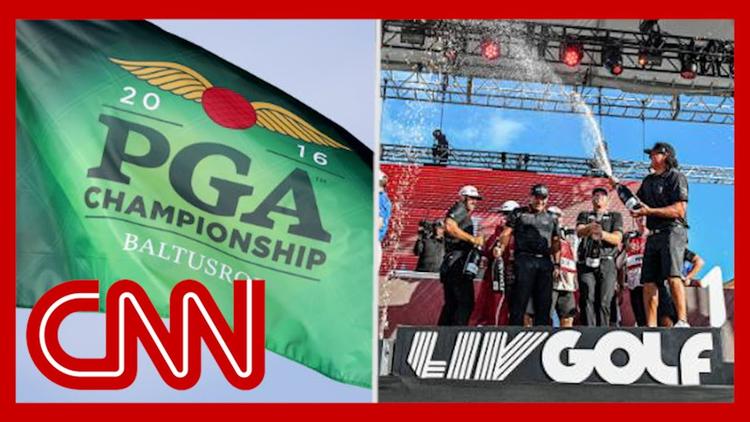By David Rowe, Western Sydney University | –
Professional golf – and increasingly world sport – is caught in a sand trap. Not the familiar hazard between fairway and green, but the Middle Eastern desert producing enormous quantities of fossil fuels.
The resulting riches are being diverted into sport, disrupting its traditional Western dominance.
The latest example is the dramatic announcement that LIV Golf, the rebel circuit led by retired Australian golfer Greg Norman and backed by Saudi Arabia’s Public Investment Fund, has merged with the (US) PGA and (European) DP World Tours after two years of trench warfare.
While today’s big story is LIV Golf, Saudi Arabia’s involvement in sport will generate many more money-driven, politics-heavy headlines.
Welcome to the ‘party hole’
There are echoes here of Kerry Packer’s World Series Cricket and Rupert Murdoch’s Super (Rugby) League. An aggressive, well-funded competitor takes on the sport establishment, promising to shake up a sclerotic game, bringing in new money and younger fans with lashings of razzmatazz.
Embed from Getty Images
OSAKA, JAPAN – JUNE 29: U.S. President, Donald Trump (L) meets Crown Prince of Saudi Arabia, Mohammad Bin Salman Al Saud (L) on the sidelines of the second day of the G20 Summit at INTEX Osaka Exhibition Center in Osaka, Japan on June 29, 2019. (Photo by Bandar Algaloud / Saudi Kingdom Council / Handout/Anadolu Agency/Getty Images)
LIV Golf offers shorter stroke play contests and a competitive team format. This April, Australia got a taste of it in Adelaide. Large, raucous crowds turned up, witnessing innovations like a “party hole” complete with terrace, bars and a DJ.
LIV lured leading golfers such as Australia’s Cameron Smith with enormous contracts, in his case worth A$140 million (US$93.4 million). In response, the main tours banned LIV-signed golfers from most of their tournaments. Inevitably, it ended up in the courts, with LIV suing the PGA Tour for restrictive practices, and the PGA countersuing for inducement to break contracts.
Peace suddenly broke out this week via a joint news release announcing the tours and LIV Golf would morph into a collectively owned, for-profit entity. This came as a shock to tour golfers in an ostensibly player-run organisation, who found out via Twitter.
Even Greg Norman – a pivotal but deeply divisive figure – was apparently blindsided and discarded.
With Saudi Arabia’s Public Investment Fund governor Yasir Al-Rumayyan as chair and PGA Tour commissioner Jay Monahan as chief executive, the so-far unnamed entity must heal some deep wounds. Golfers who refused massive LIV contracts and believed Monahan’s defiant rhetoric feel sold down the river. It will take more than boosterist words from golf’s inner circle to placate them.
CNN: “PGA Tour announces shock merger with Saudi-backed LIV Golf”
Golf’s turmoil is symptomatic of the impact of huge injections of capital into sport from outside the US and Europe. It does not only come from the Middle East. The Indian Premier League, both men’s and women’s, has comprehensively refashioned the economy of world cricket.
China has invested huge sums in soccer, and Beijing is the only city to have hosted both the Summer and Winter Olympics.
But the Middle East is where commercial sport is seen as the future of a post-carbon economy. Last year, Qatar hosted the men’s FIFA World Cup and is steadily supplementing its sports infrastructure, while the United Arab Emirates and Bahrain have committed large sums to motorsports and cricket.
Saudi Arabia is making the biggest impact on global sport through its A$10 trillion (US$6.7 trillion) Vision 2030 plan to diversify its economy under leader Crown Prince Mohammed bin Salman (also known as MBS).
Money and image
Human rights come to the fore every time such non-Western countries host a major sport investment or buy a major sport property. A 2021 report by human rights group Liberty found Saudi Arabia had recently invested more than A$2 billion (US$1.3 billion) in sport. Much more since has been spent on sports such as football, golf, motor racing and cricket.
In the world game, Saudi Arabia’s Public Investment Fund bought English Premier League club Newcastle United, and has recruited superstars such as Cristiano Ronaldo and Karim Benzema to the Saudi Pro League.
The sight of a laughing FIFA President Gianni Infantino seated alongside MBS at the Qatar World Cup opening ceremony fuelled suspicions that the kingdom’s bid for the 2030 men’s World Cup has the inside running.
Sport investment is clearly part of the country’s economic agenda, but also its political positioning. Such sportswashing is a method used by illiberal regimes to cover up the ugly face of repression. Despite some loosening of controls over women in Saudi Arabia in areas like driving cars, MBS undermined his claim to be a moderniser when 81 people convicted of crimes ranging from murder to “monitoring and targeting officials and expatriates” were beheaded on one day in March 2022.
Critics of the sportswashing concept argue that it’s imprecise, and moreover is a routine feature of national and corporate public relations all over the world. It is also used selectively, despite countries like Australia having their own deficient human rights records regarding First Nations peoples and refugees, and trading freely with repressive nations.
But sport attracts greater scrutiny because it is carried on television screens, not container ships. This profile was clear when Infantino was forced, after an angry response by players, to abandon plans to make Visit Saudi a major sponsor of the 2023 FIFA Women’s World Cup in Australia and Aotearoa New Zealand.
Saudi tourism may have missed out this time, but Saudi capital will continue visiting many more sports and countries.![]()
David Rowe, Emeritus Professor of Cultural Research, Institute for Culture and Society, Western Sydney University
This article is republished from The Conversation under a Creative Commons license. Read the original article.



 © 2024 All Rights Reserved
© 2024 All Rights Reserved